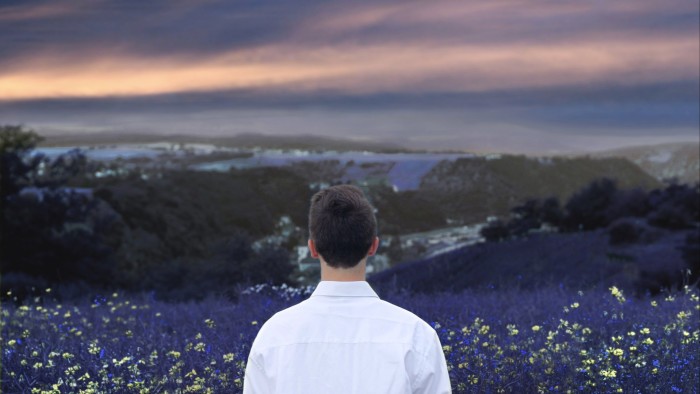Summarize this content to 2000 words in 6 paragraphs in Arabic Unlock the Editor’s Digest for freeRoula Khalaf, Editor of the FT, selects her favourite stories in this weekly newsletter.“Flower & Herb soon fill the air with an innumerable Dance,/ Yet all in order sweet & lovely, Men are sick with Love,” reads the epigraph — taken from William Blake’s Milton — of Seán Hewitt’s Open, Heaven. It’s amour fou that afflicts the protagonist of this heady debut novel, from his boyhood until he becomes the middle-aged, divorced, nostalgic librarian who narrates the story. Scouring his memories of one formative summer when he was a teenager, the self-professed “fantasist” looks back over a time that left him suspended in a state of insatiable, delirious longing — and, in adulthood, unable to commit to an attainable relationship.James’s lovesickness stems partly from the fact that he is gay. Since he was a boy he has “fixated only on those I thought would not reciprocate”. Hewitt captures to heart-rending effect the shame attached to queer desire, his young, anxiously timid character fearing it could “tear right through the fabric of the world”. The propulsive, hormone-addled events of the novel play out against the intoxicating, often cloying atmosphere of an unspoilt English villageAfter coming out to his parents and, inadvertently, the entire village of Thornmere, James becomes well versed at concealing and stifling his yearnings for male classmates to avoid bullying — but with such suppression, his torment only deepens. Into this tinderbox of emotion, the dashing stranger Luke arrives, cast out by his mother to live temporarily with his aunt and uncle on their farm. He is a harbinger of “trouble”. (A little heavy-handedly, the recent school-leaver is the son of a prison inmate and something of a rebellious miscreant himself.)Cheshire-born, Dublin-based Hewitt is best known as a poet, and his first foray into fiction is unsurprisingly sensuous and decadent. As in Rapture’s Road, the eco-poet’s 2024 collection which is shortlisted for the Dylan Thomas Prize, a sense of lament ties together resplendent descriptions of nature with personal tragedy. The propulsive, hormone-addled events of the novel play out against the intoxicating, often cloying atmosphere of an unspoilt English village. In this “sunlit reel of days”, James remembers “broken windows choked with ivy”, “a wood pigeon started up like a metronome” and “yellow cowslips and celandine like buttery stars”. In equally heightened and unflinching prose, James recalls the agony of queer adolescence: the school changing rooms where “the sight and smell of the boys undressing was almost unbearable”. Sprawling passages are pierced by the acute observations of an outsider looking in on other boys’ lives. Repeatedly he finds “it hard to imagine what men spoke about”.The detailed account of James’s coming-of-age nearly eclipses his love interest, Luke, entirely. The swaggering, nonchalant newcomer James first meets while he mucks in with a milk round is as much as a figure of teen fantasy as a real character, though behind his ineffably cool veneer is an occasional glimpse of “a different person to the one I remembered”. Given his back-story, James believes Luke has “lived a longer life than I had” and, in spite of his obvious vulnerability, imagines him to have a violent streak, an “anger that could travel from one generation to another”. As they grow closer and James pines for him, the nature of their relationship begins to cloud. The short-sighted self-absorption of Hewitt’s protagonist-narrator — and the resulting flatness of others — sometimes makes him difficult to get onboard with. Yet Hewitt’s wistful, reverie-like writing captures the painful queer experience of confusing friendship for romantic love. At the heart of Open, Heaven is a bittersweet paradox: “If, by some chance, the object of my desire desired me,” admits James early in the novel, “I had the sense that the desire might evaporate altogether.” Open, Heaven by Seán Hewitt Jonathan Cape £16.99, 240 pagesJoin our online book group on Facebook at FT Books Café and follow FT Weekend on Instagram and X
رائح الآن
rewrite this title in Arabic Open, Heaven — Seán Hewitt’s sensuous and decadent debut novel
مال واعمال
مواضيع رائجة
النشرة البريدية
اشترك للحصول على اخر الأخبار لحظة بلحظة الى بريدك الإلكتروني.
© 2026 جلوب تايم لاين. جميع الحقوق محفوظة.










